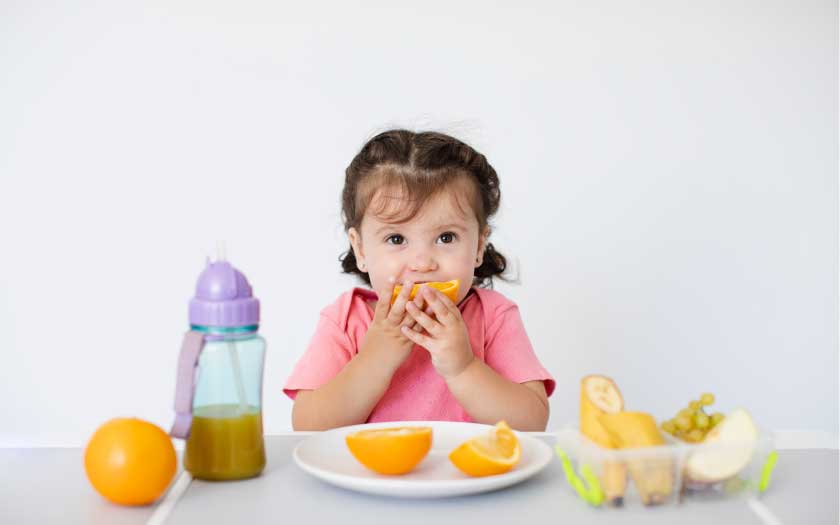Let’s face it – eating healthy is something even adults struggle with, even though it’s something doable! It’s no secret these days that eating the right kinds of food will help keep all sorts of illnesses at bay, and the younger a person develops the taste for healthy foods, the better!
So, if you would like your child to walk the route of healthy eating, the time to start is now!
Nutrition should always remain a top priority, even after a baby weans off breast milk. This is the time baby transitions into toddlerhood and when parents will find themselves busy shifting gears to accommodate a new era where their toddlers venture into independent eating and drinking. It’s easy to give up at this point, and just give your child whatever he asks for, even if it’s not good for him, but remember, children, develop eating habits easily at this age, especially if there are sweet-tasting food involved! If you think your little one is beginning to have a penchant for sweet drinks and food, get a hold of this situation and turn it around before it gets out of hand! Tip: Offer fruits instead of candy, cake, or sweet drinks.
The crucial first bites & developing tastebuds
Between 12-24 months, toddlers will begin to learn what it’s like to eat solid food. They’ll be introduced to new tastes and textures. Variety is the key to ensuring a toddler gets the nutrition needed to thrive and develop well. For this to happen, parents have to be mindful of the food offered to their little ones and strive to get them introduced to as many new wholesome foods as possible! Tip: Start the first week or two with pureed vegetables instead of fruits, for you don’t want your baby to refuse new foods just because they’re not sweet-tasting as what they had the first time. Getting babies to like the taste of vegetables is harder than getting them to like fruits, so, it will help immensely to hold off the latter for as long as you can.
Encourage, don’t force
If your toddler isn’t hungry, it just means that his or her body does not need the extra energy! This is especially so if the little one is happily playing, seems to be fine, and is not seriously ill. So, there is no need to bribe a bub to clean off that plate, and there is certainly no need to lose your cool either! Remember too, that you do not want your little one to associate mealtime with anxiety and frustration. Forcing toddlers to eat when they’re not hungry also weakens their sensitivity to their hunger and fullness cues.
Keep portions small – if they want more, you’ll know
Many parents are guilty of piling up their children’s plate with food, especially if they’re serving a favourite, in hopes of tricking them into eating more. The result? Most of the time, the little ones are overwhelmed and are also denied the opportunity to independently ask for more.
Keep proper mealtimes
As far as possible and if their appetite allows it, toddler’s meals and snacks should ideally be served at the same time every day. Milk or diluted fruit juice may be offered with these meals or snacks, but in between them, water will be the best thirst quencher for growing bodies. Note: Watch that your toddler does not overload on juice, milk, or snacks throughout the day, for that might decrease his or her appetite for nutritious meals.
Be patient (with new foods)
It’s highly unlikely that you would remember your own experiences with new foods when you were a tiny tot, but chances are high that you didn’t take too easily with certain foods. Your toddler is no different and has the right to take his or her time to determine if they like a certain food after trying it out. It’s not uncommon for toddlers to touch or smell new foods, taste them, and then take them back out again. Some toddlers might also need repeated exposure to a new food before they even take the first bite!
You can offer encouragement to your child by talking about a food’s color, shape, aroma, and texture. If you have to talk about the taste, always maintain positive descriptions. Also, try serving new foods on the same plate with your little one’s favorite foods.
Why milk should stay
Milk should always remain an important part of a toddler’s diet for it provides calcium and vitamin D to help build strong bones. Toddlers should have 700 milligrams of calcium daily, and to help absorb this, 600 IU (International Units) of vitamin D a day should accompany it. This calcium need is met if kids get at least two servings of dairy foods every day. As for vitamin D, doctors sometimes recommend vitamin D supplements, for the daily requirement is not easily met through dairy foods.
Kids between the age of 12 to 36 months old should be offered a good quality milk formula to help provide the dietary fats they need for better growth and brain development.


